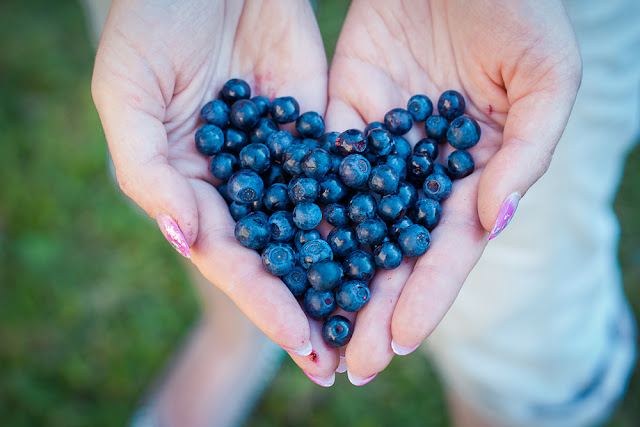SUPERFOODS: In
the world of nutrition, the term superfood is commonly seen, used to describe
foods with health benefits. Of the thousands of items to choose from, what
exactly qualifies a food to be ‘super’? There’s
no official scientific definition of a super food, but it’s generally accepted
that superfoods contain high levels of much-needed vitamins and minerals. They
can also be a source of antioxidants; substances that shield our bodies from
cell damage and help prevent disease. While there are a number of common foods
that provide these nutrients, below discuss some of the most well-known superfoods
and the reasons as to why these foods get to claim the title.
 Blueberries: These fruits have the ability to lower
blood pressure, reduce risk for cancer and heart disease, and have
anti-inflammatory effects. They are full of antioxidants, Vitamin C, and
Vitamin K. When picking some up at the grocery store, go for the ones that are
darker in color – they have more antioxidants!
Blueberries: These fruits have the ability to lower
blood pressure, reduce risk for cancer and heart disease, and have
anti-inflammatory effects. They are full of antioxidants, Vitamin C, and
Vitamin K. When picking some up at the grocery store, go for the ones that are
darker in color – they have more antioxidants!
Fish: This form of protein has the ability
to lower heart disease risk, as well as help with arthritis and memory loss.
Salmon is a great option as it is full of Omega-3s which help with heart
health. It is recommended to have fish 2-3 times a week.
Avocado: Some people can be wary of avocados because they are full of fat – but its healthy fat! This fruit is filled with
oleic acid, lutein, folate, Vitamin E, monounsaturated fats, and glutathione which
protect from heart disease, certain cancers, as well as degenerative eye and
brain diseases.
More
Veggies: Vegetables
like cauliflower, cabbage, Brussels sprouts, and broccoli have been shown to
have cancer fighting abilities. Leafy greens like kale and spinach are packed
with fiber, vitamins and minerals, and folate and also help fight off heart
disease and cancer.
Eggs: Eggs have historically been a controversial topic in the
nutrition world due to their high cholesterol content, but they remain one of the healthiest foods. Whole eggs are rich in many
nutrients including B vitamins, choline, selenium, vitamin A, iron and phosphorus. They’re also loaded with
high-quality protein. Eggs contain two potent antioxidants, zeaxanthin and lutein,
which are known to protect vision and eye health.
For
best success, find options for these foods that fit your lifestyle and taste
preferences. The more you tailor healthy eating to you, the less it feels like
a chore or something you have to do. Branch out and try foods you haven’t tried
before – you might be surprised at the results! A diet packed full of these
superfoods will leave you feeling energized and ready to take on the day.
Thank You!!





Comments
Post a Comment